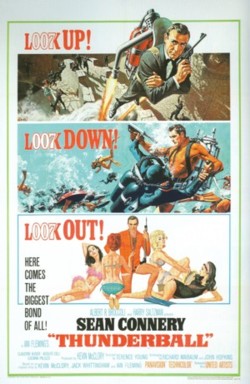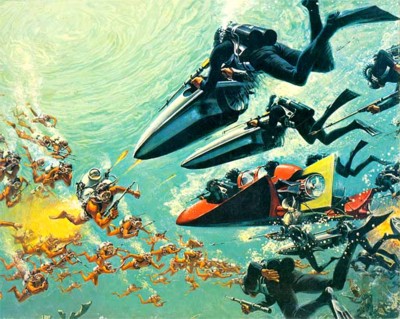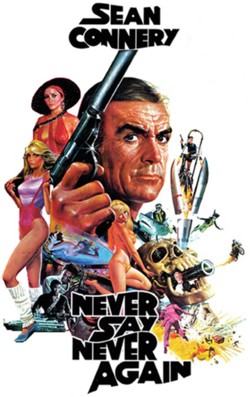The Thunder ChildScience Fiction and Fantasy |
| |
| |

|
James Bond Sourcebook: Kevin McClory Review by Ryan Brennan James Bond Sourcebook - Review of Casino Royale (2006)
His real claim to fame, however, is his involvement in the saga of the James Bond story Thunderball, the original screenplay that resulted in the novel and the two films based upon it. When Fleming and two partners planned to produce a film based on the author's creation, McClory's film pedigree, based on his above noted credits, was impressive enough to win him the director's chair. He and Jack Whittingham worked with Fleming on an original screenplay featuring Fleming's character James Bond. The project didn't pan out and the collaborators went their separate ways. Faced with a deadline and few ideas for a new novel, Fleming fell back upon the work done for Thunderball. When McClory read the novel he realized that it was based in part on his and Jack Whittingham's work for the failed movie. He sued, but was unable to stop publication of the novel. However, his lawsuit had another effect. Harry Saltzman and Albert Broccoli had entered into a distribution agreement with United Artists. UA wanted the first Bond film to be Thunderball. Although a fresh screenplay was written, McClory's legal action caused UA, Saltzman and Broccoli to cancel plans to film the novel. McClory's action did result in muddying ownership issues of the book. Fleming's out-of-court settlement, just as From Russia With Love played to great success, gave McClory and Whittingham book jacket credit but, more importantly, vested film rights with McClory. Armed with these rights, McClory announced that he would produce a film from Thunderball even as Eon, the Saltzman/Broccoli company, were preparing their next Bond adventure Goldfinger. Although he generated an enormous amount of press on his project, McClory eventually struck a bargain with Eon Productions, Saltzman and Broccoli's company, which was eager to keep all competing Bond films off the market. The two producers would deal with this eventuality when Charles K. Feldman mounted his renegade Bond film spoof Casino Royale.
Adjusted for inflation, the film made well over $750 million internationally. It is tempting to think that McClory, resting on a mountain of gold, was seduced into dedicating the rest of his life to the protection and exploitation of his rights in the Thunderball property. If Saltzman and Broccoli thought McClory would go away they were mistaken. He asserted his rights again when he claimed that the fictional secret organization S.P.E.C.T.R.E. and the character Ernst Stavro Blofeld were created for Thunderball. After Diamonds Are Forever neither S.P.E.C.T.R.E. nor Blofeld ever officially appeared in a Bond film again, a great loss to the series. (In a jokey pre-title action sequence, Blofeld clearly appeared anonymously at the beginning of For Your Eyes Only.)
McClory continued to pursue new Bond projects, a TV show was discussed with Pierce Brosnan, then a movie, Warhead 2000, A.D. rumored to star Timothy Dalton. In the late 1990s deals were made which brought all of the Bond films under the control of Eon. Still McClory persisted, bringing lawsuits claiming proprietary rights in the actual creation of the Bond character. Unfortunately for him, this latter claim was judged as coming too late to have merit and another McClory Bond film was never made. In his own way, McClory was as persistent in protecting his rights to Bond as Saltzman and Broccoli were in protecting theirs. He was a shrewd businessman and there is something admirable in his Irish determination and tenacity to never stop pursuing what he felt belonged to him. However, it is sad that this tremendous energy and drive wasn't directed into the production of other films, particularly once he had accomplished the goal of producing Thunderball. Who knows what cinematic delights he might have provided for audiences of the world had he not made Bond the focus, or, perhaps, obsession, of his creative life? Thanks to American Art Archives for permission to use the Frank McCarthy illustration.
|
Recommended Reading
Recommended Viewing
|
All text © 2006 The Thunder Child unless otherwise credited.
All illustrations retain original copyright.
Please contact us with any concerns as to correct attribution.
Any questions, comments or concerns contact The Thunder Child.


